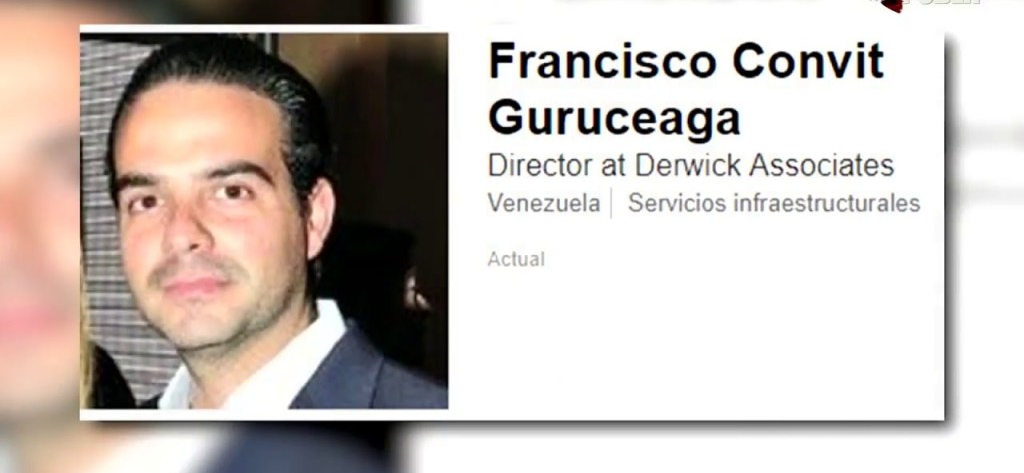
Spanish – Nicolás Maduro’s police arrested Venezuelan tycoon Francisco Convit who is accused in the United States of laundering US$1.2 billion from PDVSA. This is one of the few arrests that Venezuelan authorities have made against those who participated in the embezzlement of the nation.
According to information from journalist and co-editor-in-chief of the PanAm Post, Orlando Avendaño, the political police, Sebin, initiated the arrest of Convit when he was on his way from Caracas to the famous Margarita Island.
Detuvieron saliendo de Maiquetía al bolichico Francisco Convit.
— Orlando Avendaño (@OrlvndoA) January 26, 2020
Commissioner Iván Simonovis, interim president Juan Guaidó’s Special Commissioner for Security and Intelligence, also confirmed the news: “There is no precise information about the arrest, but he is being held in custody.”
Convit, better known as one of the “bolichicos” who became rich with the arrival of Hugo Chávez’s regime, is the central player in the investigation of a mega-corruption case, where conspirators planned the embezzlement of up to 1.2 billion USD from the state-owned oil company Petróleos de Venezuela.
FRANCISCO CONVIT Es la figura central junto con Alejandro Betancourt en mega caso de corrupción, donde se malversaron $1,200 millones de PDVSA. Parte de los fondos pasaron por manos del empresario Raúl Gorrín, y de los hijastros de Maduro. pic.twitter.com/FPeo7DJXqU
— Carlos Peñaloza (@GenPenaloza) January 27, 2020
Part of the illicit funds passed through the hands of Convit and his partner Alejandro Betancourt, but also through the hands of Raúl Gorrín, and Nicolás Maduro’s stepchildren. The odd thing is that Betancourt is still free in Spain and Gorrín in Venezuela.
According to U.S. authorities, the bolichicos obtained at least 600 million USD thanks to exchange controls in Venezuela. However, it is improbable that the regime of Nicolás Maduro, which is an accomplice and participant in PDVSA’s embezzlement, will extradite Convit to the United States.
Mathias Krull, a German national who worked as an executive for the Swiss bank Julius Baer, pleaded guilty in 2018. Krull admitted to using his position at the Swiss bank to attract private clients, mainly from Venezuela. Among them was Francisco Convit.
The hypothesis of the arrest
The Nuevo Herald explains that Convit has much information about money laundering operations involving high officials of the regime and there is a possibility that such an arrest “could be related to the activities of Betancourt in Spain, where the latter hired the services of Donald Trump’s lawyer, Rudolph Giuliani, to help him get favorable treatment for the same case, where he is also under investigation.”
Si es verdad q @NicolasMaduro quiere dizque tender puentes con gobierno @realDonaldTrump, desde luego q mandar a Francisco Convit con un lazito de regalo es un buen primer paso.
Los del interinato ni de verga van a entregar a sus financistas.
— Alek Boyd “Plagiarism is corruption” (@infodi0) January 26, 2020
Nicolás Maduro is also under investigation in the case. Therefore, some speculated that Convit might have been arrested to prevent him from eventually seeking a deal with the U.S. Attorney’s Office to gain immunity from prosecution and get a better deal in exchange for information concerning top officials of the Venezuelan regime.
Another hypothesis is that Maduro would be seeking to “build bridges” with the U.S. government and would, therefore, be thinking of extraditing Convit to the United States. This may also be a hard blow to the Venezuelan opposition, which, according to researchers such as Alek Boyd, is reportedly financed by the same “bolichicos.”
The expression “bolichicos” was created in 2010 by Venezuelan writer and journalist Juan Carlos Zapata to refer to “the new gang of rich people in Chavista days.” That is, young entrepreneurs with wealthy families in Caracas who have multiplied their fortunes by primarily being contractors for the regime of Hugo Chávez, and then Nicolás Maduro.
The investigation
So far, nine defendants have been charged in Miami, two of whom pleaded guilty and one is awaiting trial. However, according to the U.S. newspaper, there are a dozen businessmen involved, allegedly including Venezuela’s Alejandro Betancourt.
The newspaper El Confidencial has indicated that both Betancourt and Convit are related to the Venezuelan electricity crisis since they are the managers of Derwick Associates Corp, which has received contracts worth millions during the regimes of Hugo Chávez and Nicolás Maduro for the construction of thermoelectric plants, some of which have not yet been completed.
According to a report on the energy sector written by the NGO Transparencia Venezuela, Derwick received 11 construction contracts worth USD 2.9 billion, which would have been overvalued by an average of 162%.
The company was registered in Panama in 2003 and in Barbados in 2009 but had never before built a plant like the one required by the state electricity company Corpoelec.
According to the newspaper La República, the members of the group of famous “Venezuelan bolichicos” included Leopoldo Alejandro Betancourt López, president of the board of directors and founder of Derwick Associates; Pedro Trebbau López Derwick, vice president of Derwick Associates; Francisco Convit Guruceaga, shareholder of Derwick Associates; Domingo Guzmán López, director of Derwick Associates Venezuela; and Orlando Alvarado, portfolio manager and director of O’Hara and its affiliates.
“It was precisely through Derwick, a company dedicated to the construction of electricity generation plants, substations, and hydro and thermal electricity plants, that the “bolichicos” began to obtain contracts in Venezuela, to the extent that they reached 11 agreements within a year between 2009 and 2010.
 Versión Español
Versión Español













